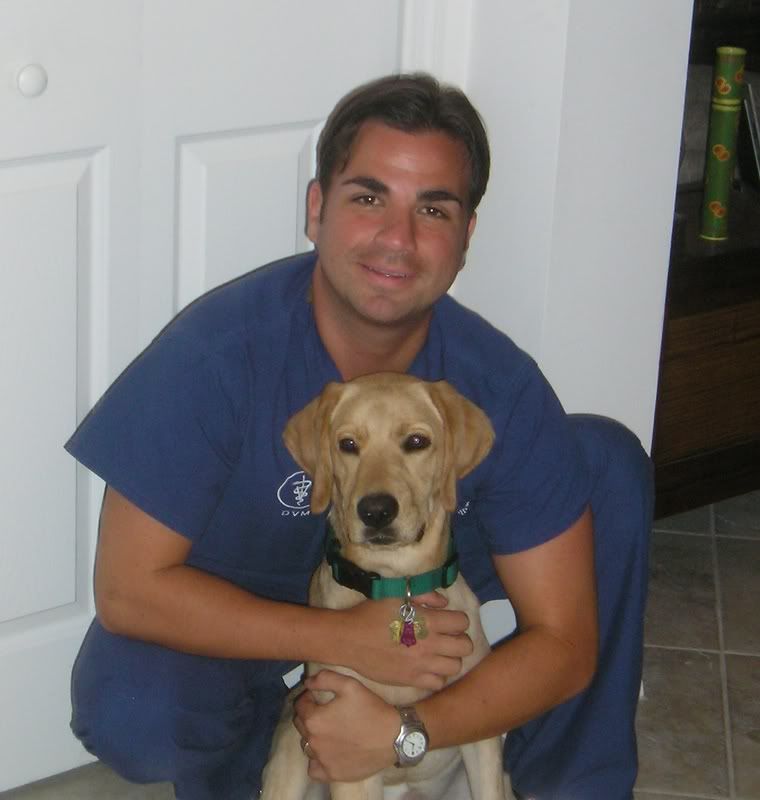CLICK HERE TO WATCH VIDEO AT MY YOUTUBE CHANNEL
Hello viewers, readers, listeners,
As always, I posted both the video and transcript for this episode of The Web-DVM. If you are one who typically prefers to read the transcript tather than watch the video, I urge you just this once to watch the actual video, as the photographs and video footage of this cat can only be trully appreciated viewed directly. Enjoy!
Roger Welton, DVM
Transcript from this week's episode of The Web-DVM:
I did not have to look far for this week’s news story, as this one comes right from my own home. This story is about Forrest, the cat who loves babies.
Forrest is a Devon Rex cat, a feline breed known for quirkiness and often downright eccentricity, but gentle, tolerant to their core, and very snuggly little cats.
While Forrest will enthusiastically snuggle up to any person who
takes a moment to pay attention to him, he has a special affection for
babies. It began with my first child
Austin, when Forrest would wait by the door for my wife or me to enter his
nursery in the morning, only to rush in, jump into his crib, nuzzle our infant
son, and flop down next to him purring loudly.
Whether we were bathing, dressing, or changing Austin, Forrest
was always right there snuggled up against him.
But Forrest was at the time only still a mere kitten himself,
about 6 months of age. We thought
perhaps Forrest simply saw the baby as merely another “kitten” to play with, or
was just simply overwhelmed with kitten curiosity over this strange little
human creature.
But then came baby Scarlett, and by the time of her birth,
September 2010, Forrest was an adult cat over 2 years of age, my son Austin by
now 2 ½. While Forrest remained
remarkably tolerant of and affectionate toward Austin, his obsession with him
was not quite as intense. And the from
moment we brought home our infant little girl, his attention turned from Austin
altogether and Forrest once again became a cat obsessed, with yet another baby.
My wife took this photograph [see video for image] of Forrest after he had jumped in
the crib to cuddle with Scarlett when she had turned to put some of Scarlett’s
clothes in the hamper. And you can
clearly see, the love is not one sided.
In fact, wherever my daughter may be crawling around in the house, you will find Forrest right there, ready to cuddle her as she pleases, something she takes full advantage of often, as she does in this video my wife shot just the other day.
- Video Clip of Forrest
and Scarlett cuddling on the kitchen floor [see webcast for video footage] -
Yes, Forrest loves his baby indeed and Scarlett clearly loves
him back. While this friendship is a
most unlikely one, it is as real as it gets, and for us and our extended
family, a heartwarming spectacle that plays out every hour of every day right
in our home.
I take heart in the fact that Forrest is still young, only 3 ½
years of age, and that hopefully one day he will still be with us the day
Scarlett is old enough to appreciate this video and realize that her very first
BFF in this world was a silver and black Devon Rex, named Forrest.
This is Roger Welton reporting, for The Web-DVM.
Dr. Roger Welton is the President and chief veterinarian at Maybeck Animal Hospital in West Melbourne Florida, as well as CEO of the veterinary advice and health management website Web-DVM.net.
Dr. Roger Welton is the President and chief veterinarian at Maybeck Animal Hospital in West Melbourne Florida, as well as CEO of the veterinary advice and health management website Web-DVM.net.



